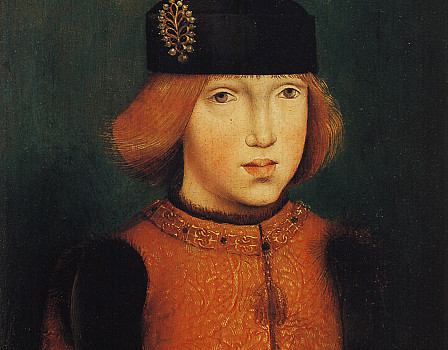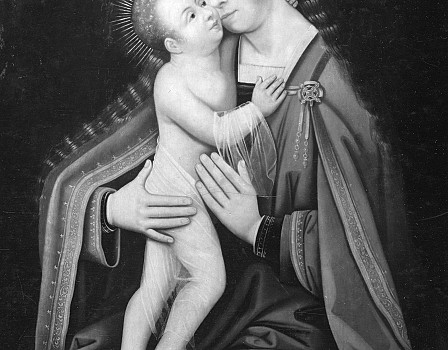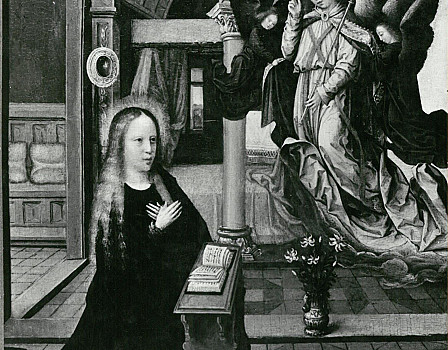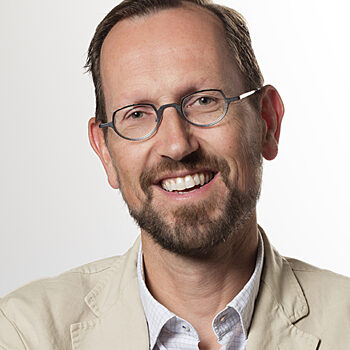Centre for the Study of the Flemish Primitives
In the 15th century, the artists of the Southern Netherlands took our rich heritage to the very top. With the Centre for the Study of the Flemish Primitives, the Royal Institute for Cultural Heritage (KIK-IRPA) boasts an internationally renowned research unit for the study and inventorying of these paintings, which can be found in museums and collections worldwide.
Flemish masters of the 15th century online
Our main focus is to create an inventory of the works by the Flemish Primitives and unlock the knowledge of and research into these works. We have been doing this for many years through publications, unique documentation and the Friedländer database, which provides an overview of all paintings by the 15th-century Flemish masters.
Did you say Friedländer?
Max Jakob Friedländer (1867-1958) was the first art historian to make an inventory of Early Netherlandish paintings. The first edition of his work appeared in German (1924-1937); the second, expanded edition in English (1967-1976). The latter consists of fourteen volumes, which you can download here: Early Netherlandish Painting. Our Friedländer database is the third ‒ digital ‒ edition, focusing on the 15th century and supplemented with all the missing paintings, which were not known to Friedländer, but are known to the Centre for the Study of the Flemish Primitives.
A preview:

Master of the Legend of the Magdalen


Search the Friedländer database
Driving force for scientific research
Scientific research has been the core activity of the Study Centre since its foundation by Paul Coremans in 1949. The Adoration of the Mystic Lamb by the Van Eyck brothers, a masterpiece in Western art history, had just returned to post-war Belgium, having been retrieved from the Altaussee salt mines near Salzburg. The Study Centre then published two pioneering studies on the polyptych: a voluminous photo book with unseen macro photos (1948) and an innovative natural science study, L'Agneau Mystique au Laboratoire (1953).
Bart Fransen, head of the Study Centre: “We remain faithful to our foundations: our research is systematic, richly documented, interdisciplinary and available to a wide audience. We research all Flemish Primitives, but Jan van Eyck has a special place in our hearts. He is our favourite and still plays a pioneering role in our work, as evidenced by the leading projects of recent years: the restoration of the Ghent Altarpiece, the recent publications on the polyptych, the website Closer to Van Eyck and finally the VERONA project that won the European Heritage Award.”

Unique documentation centre
The Study Centre has an unparalleled collection of documents on the works of the Flemish Primitives, some six thousand paintings in total, spread across museums and collections worldwide. We continuously replenish our material and make it available to researchers via multiple channels:
- The specialised library is exclusively centred on the Flemish Primitives. The catalogue is accessible online via BALaT. Would you like to come and consult our collection? Please make an appointment via infoXV@kikirpa.be or phone us on +32 2 739 68 66.
- The photo archive. Here you will find some forty thousand photographs and detailed shots of works by 15th-century Flemish masters. You can consult the pictures taken by the Royal Institute for Cultural Heritage and download them free of charge via BALaT.
- The Friedländer database is an online overview of all the works by the Flemish Primitives between 1400 and 1500. It is a digital continuation of the leading work on this subject: Early Netherlandish Painting by Max Jakob Friedländer.

We remain faithful to our foundations: our research is systematic, richly documented, interdisciplinary and available to a wide audience. We research all Flemish Primitives, but Jan van Eyck has a special place in our hearts.

Scientific publications
Three scientific series present the results of the various research projects of the Study Centre, often carried out in cooperation with local and foreign specialists:
- The Corpus of Flemish Primitives offers a scientific analysis of paintings by the Flemish Masters between 1400 and 1500 in various important public collections. The texts are richly illustrated with detail photographs and technical documents.
- The Repertory of Flemish Painting in the 15th and 16th centuries is dedicated to studying Flemish paintings from little-known or difficult-to-access collections. It is an indispensable tool for further scientific study.
- In the Contributions to the Study of the Flemish Primitives, specific subjects in 15th-century Southern Netherlandish painting are treated in detail.
Discovered a Flemish Primitive?
Are you researching a 15th-century painting by a Flemish master, or do you have one in your collection? The Study Centre will be pleased to help you with free initial advice or with its extensive expertise in art historical research, attribution and dating. Feel free to send us an e-mail with some information about your project.
We cannot value your work, and we do not issue certificates. For technical research and conservation treatment, we will put you in contact with our colleagues at the Painting Studio, the Painting Lab or the Scientific Imagery Unit.
Are you looking for an exciting internship?
Are you under the spell of the Flemish Primitives and looking for experience in art historical research, publishing or managing documentation? Then our Centre is the right place for you. We welcome art history interns from Belgium and abroad, involve them in our activities and pass on our knowledge and passion.
Working in interdisciplinarity throughout my internship was particularly striking and my research work is still deeply influenced by it today.
Scientific Committee
In our scientific activities, we are advised and assisted by a committee of specialists from the academic and museum sectors:
Permanent members: Till-Holger Borchert (Aken, Suermondt-Ludwig Museum) | Dr. Véronique Bücken (KMSKB-MRBAB, Brussel) | Prof. Dr. Valentine Henderiks (ULB, Brussels) | Prof. Dr. Maximiliaan Martens (Universiteit Gent) | Dr. Cyriel Stroo (KIK-IRPA)
Non-permanent members: Dr. Ingrid Falque (UCL, Louvain-la-Neuve) | Dr. Daan van Heesch (KBR, Brussel) | Dr. Anna Koopstra (Musea Brugge) | Prof. Dr. Didier Martens (ULB, Brussel) | Prof. Em. Dr. Catheline Périer-D'Ieteren (ULB, Brussel) | Jean-Luc Pypaert
Ex oficio: Dr. Dominique Van Wijnsberghe | Dr. Christina Currie
Contact the Centre for the Study of the Flemish Primitives

Our experts
You can contact us by e-mailinfoXV@kikirpa.be or by phone +32 2 739 68 66.



